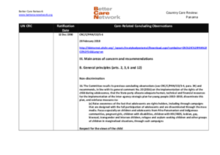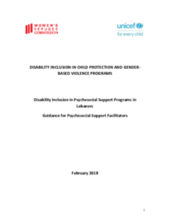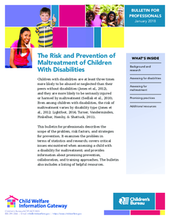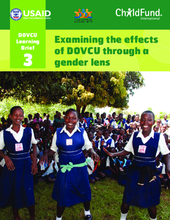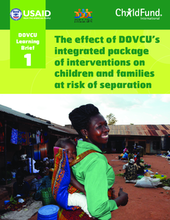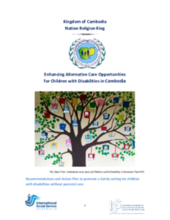Displaying 251 - 260 of 493
This country care review includes the care-related Concluding Observations adopted by the Committee on the Rights of the Child and the Committee on the Rights of Persons with Disabilities.
This article reports the findings of a multi-country study of medical professionals' perceptions and evaluations of children in three Eastern European countries (Romania, Bulgaria, Moldova).
This resource is designed to support PSS Facilitators to strengthen inclusion of children and adolescents with disabilities in a range of PSS activities, including community based and focused activities.
This study explores violence experienced by children with disabilities based on data collected from four countries in West Africa- Guinea, Niger, Sierra Leone, and Togo.
Children with disabilities are at least three times more likely to be abused or neglected than their peers without disabilities, and they are more likely to be seriously injured or harmed by maltreatment. This bulletin describes the scope of the problem, risk factors, and strategies for prevention.
The purpose of the present Situation Analysis of Children with Disabilities in Albania is to generate comprehensive knowledge about children with disabilities to inform concrete actions by the Albanian government and UNICEF Albania to address the most critical rights violations of children with disabilities.
This learning brief analyzes quantitative data from both households at risk of separation and reintegrating households to understand how the “Deinstitutionalization of Orphans and Vulnerable Children Project in Uganda” (DOVCU) package of integrated social and economic interventions affects children and households differently depending on the sex of the child, caregiver, and/or household head.
The goal of the research is to gain insight into the challenges of foster care for children with behavioral problems from the perspective of experts and their suggestions for improving foster care, with the purpose of identifying guidelines for the development of specialized foster care and protecting the welfare of children with behavioral problems.
This learning brief analyzes quantitative data from the first of the project’s stated objectives: examining the extent to which “Deinstitutionalization of Orphans and Vulnerable Children in Uganda” (DOVCU) project interventions decrease vulnerabilities for households and children at risk of separation.
This report presents a needs assessment which provides a summary of the situation of children with disabilities who are living in residential care institutions and in communities in Cambodia and proposes seven key recommendations and relevant concrete actions for the short, medium and long term to improve the quality of care of children with disabilities living in institutions and to ensure that they have better access to basic services and are living in a protective environment.

